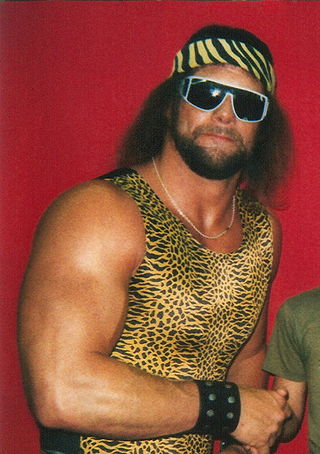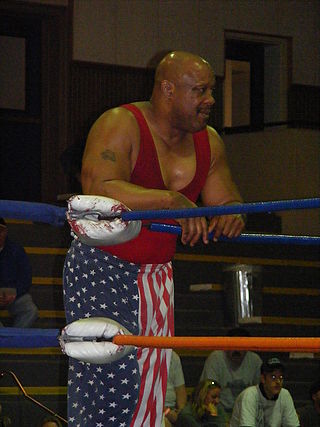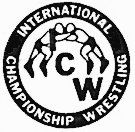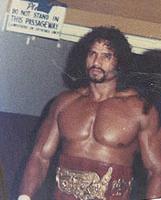Related Research Articles

Randy Mario Poffo, better known by his ring name "Macho Man" Randy Savage, was an American professional wrestler best known for his time in the World Wrestling Federation (WWF) and World Championship Wrestling (WCW).

Angelo John Poffo was an American professional wrestler and wrestling promoter. He ran International Championship Wrestling for a number of years, holding cards in Tennessee, Kentucky and Arkansas. He was the father of "Macho Man" Randy Savage and "The Genius" Lanny Poffo and the father-in-law of Miss Elizabeth.

Lanny Mark Poffo, better known by his ring names "Leaping" Lanny Poffo and the Genius, was a Canadian-American professional wrestler, motivational speaker, poet, and actor.
Mark Sciarra is an American retired professional wrestler, better known by his ring name, Rip Rogers.
Robert Michael Roop is an American retired amateur wrestler and professional wrestler whose career spanned high school, college, the United States Army, amateur and professional wrestling. He was an American heavyweight Greco-Roman wrestler at the 1968 Summer Olympics.
The ICW Television Championship was a singles championship in International Championship Wrestling. Because the championship is a professional wrestling championship, it is not won or lost competitively but instead by the decision of the bookers of a wrestling promotion. The championship is awarded after the chosen team "wins" a match to maintain the illusion that professional wrestling is a competitive sport.
The ICW United States Tag Team Championship was the top tag team championship in International Championship Wrestling. Because the championship is a professional wrestling championship, it is not won or lost competitively but instead by the decision of the bookers of a wrestling promotion. The championship is awarded after the chosen team "wins" a match to maintain the illusion that professional wrestling is a competitive sport.
The ICW United States Heavyweight Championship was a secondary singles championship in International Championship Wrestling. The title was created when The Sheik brought the now-defunct Detroit version of the NWA United States Heavyweight Championship to the promotion, making the Sheik the first ICW United States Heavyweight Champion. Because the championship is a professional wrestling championship, it is not won or lost competitively but instead by the decision of the bookers of a wrestling promotion. The championship is awarded after the chosen team "wins" a match to maintain the illusion that professional wrestling is a competitive sport.
The ICW Southeastern Heavyweight Championship was a secondary singles championship in International Championship Wrestling. Because the championship is a professional wrestling championship, it is not won or lost competitively but instead by the decision of the bookers of a wrestling promotion. The championship is awarded after the chosen team "wins" a match to maintain the illusion that professional wrestling is a competitive sport.

International World Class Championship Wrestling was an independent professional wrestling promotion based in Boston, Massachusetts. It was promoted by Angelo Savoldi and his sons Mario, Tom, and Joseph Savoldi.

The ICW / IWCCW Heavyweight Championship was the top singles championship of International World Class Championship Wrestling between 1984 and 1995 where IWCCW closed down operations. Initially ICW’s main title was the WWC Universal Heavyweight Championship, through a talent exchange program and a close working relationship between ICW and WWC the Universal Title was promoted in the New England area as the main ICW title without ever mentioning the WWC name, nor was it presented as a title owned by ICW. When the arrangement came to an end in 1985 a specific “ICW Heavyweight Championship” was created with the lineage of the WWC Universal title during the time of the working relationship. In 1993 the then champion Tony Atlas along with a number of IWCCW wrestlers left the company leaving the title vacant and only used sporadically between 1993 and 1995 where the promotion closed. Because the championship is a professional wrestling championship, it is not won or lost competitively but instead by the decision of the bookers of a wrestling promotion. The championship is awarded after the chosen team "wins" a match to maintain the illusion that professional wrestling is a competitive sport.

The ICW / IWCCW Tag-Team Championship was the top tag-team championship of International World Class Championship Wrestling between 1984 and 1995 where IWCCW closed down operations. Since the ICW/IWCCW championships were not given "world title" status by Pro Wrestling Illustrated, this championship was seen as a regional championship, although it was considered the top singles championship of the promotion. Initially ICW’s main title was the WWC World Tag Team Championship, through a talent exchange program and a close working relationship between ICW and WWC the Universal Title was promoted in the New England area as the main ICW title without ever mentioning the WWC name, nor was it presented as a title owned by ICW. When the arrangement came to an end in 1985 a specific “ICW Tag-Team Championship” was created with the lineage of the WWC Tag-Team title during the time of the working relationship. Because the championship is a professional wrestling championship, it is not won or lost competitively but instead by the decision of the bookers of a wrestling promotion. The championship is awarded after the chosen team "wins" a match to maintain the illusion that professional wrestling is a competitive sport.
The ICW / IWCCW Light Heavyweight Championship was the championship for Light heavyweights at a maximum weight of 220 lbs. in International World Class Championship Wrestling. The title existed from 1987 until the federation closed its doors in 1995. The title was first promoted as the “International Championship Wrestling Light Heavyweight” Title but was later renamed the “International World Class Championship Wrestling Light Heavyweight title” when the federation was renamed as well. Because the championship is a professional wrestling championship, it is not won or lost competitively but instead by the decision of the bookers of a wrestling promotion. The championship is awarded after the chosen team "wins" a match to maintain the illusion that professional wrestling is a competitive sport.

The ICW / IWCCW Women's Championship was a women's professional wrestling championship in International World Class Championship Wrestling that existed from 1985 until the federation closed its doors in 1995. The title was first promoted as the “International Championship Wrestling Women’s Title” but was later renamed the “International World Class Championship Wrestling Women’s title” when the federation was renamed as well. The Women's title is the earliest ICW created title in existence with both the ICW Tag-team and the ICW Heavyweight title being created after ICW and WWC stopped working together. The Women's title was only defended sporadically as ICW/IWCCW infrequently featured female competitors. Because the championship is a professional wrestling championship, it is not won or lost competitively but instead by the decision of the bookers of a wrestling promotion. The championship is awarded after the chosen team "wins" a match to maintain the illusion that professional wrestling is a competitive sport.

The IWCCW Television Championship was the short lived secondary championship of International World Class Championship Wrestling. The title existed for a little over a year before being abandoned by the promotion. The IWCCW Television title has the distinction of being the only IWCCW title that did not originate in its predecessor, the ICW, but was created after ICW and WCCW merged. The TV title was abandoned in 1993 when a number of wrestlers left IWCCW to form Century Wrestling Alliance. Because the championship is a professional wrestling championship, it is not won or lost competitively but instead by the decision of the bookers of a wrestling promotion. The championship is awarded after the chosen team "wins" a match to maintain the illusion that professional wrestling is a competitive sport.

International Championship Wrestling was an independent professional wrestling promotion based in Lexington, Kentucky that operated from 1978 until 1984. It was run by Angelo Poffo, the father of Randy Savage and "The Genius" Lanny Poffo. Throughout its history, ICW was considered an "outlaw" promotion, as it was not a member of the National Wrestling Alliance and promoted shows in direct competition against NWA regional territories.
Paul Christy was an American professional wrestler known mainly for his work in the National Wrestling Alliance and International Championship Wrestling as well as a stint in the World Wrestling Federation in the mid-1980s. Christy's wife, Bunny Burmeister, was also a professional wrestler and his manager, working under the name Miss Bunny Love. Christy and his wife both retired from the ring in 1990.

The NWA Tri-State Heavyweight Championship was a professional wrestling heavyweight championship in Tri-States Wrestling. The original version was created in 1954, however, it was phased out in favor of the NWA World Junior Heavyweight Championship.
Jeff Smith, better known as Izzy Slapawitz, was an American professional wrestler, manager and color commentator, best known for his time with International Championship Wrestling.
All-Star Championship Wrestling (ASCW) was a professional wrestling promotion that was founded in Knoxville, Tennessee by Ron Wright, Ronnie Garvin, Bob Roop, Bob Orton, Jr. and Boris Malenko in 1979. The group, informally known as "The Knoxville 5", broke away from Southeastern Championship Wrestling (SECW) and fought a six-month war against National Wrestling Alliance promoter Ron Fuller over control of the NWA's Knoxville territory. Although the "outlaw" group was successful in its efforts to oust Fuller, the promotional war is blamed for "killing" pro wrestling in Knoxville for several years during the 1980s wrestling boom.